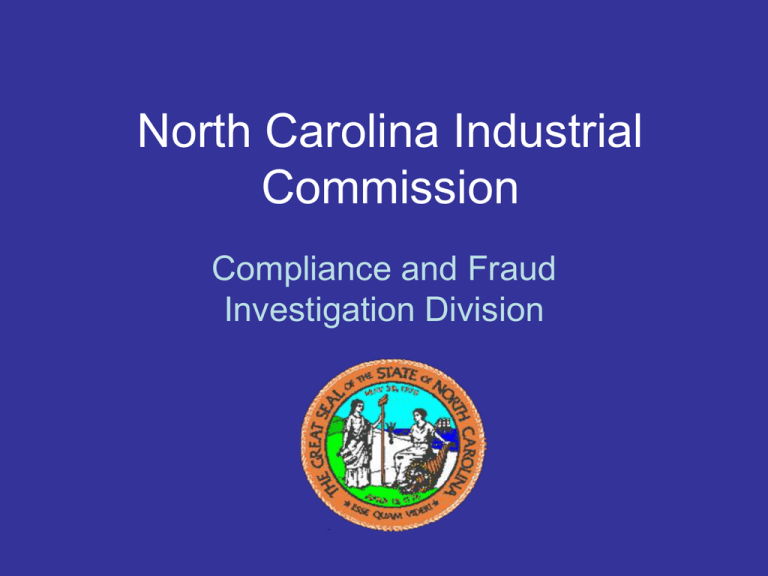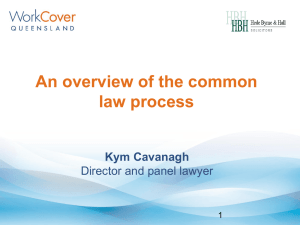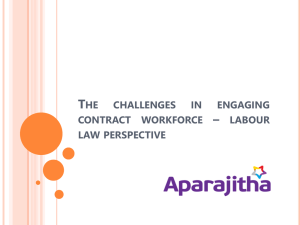Bryan Strickland - the North Carolina Housing Coalition!
advertisement

North Carolina Industrial Commission Compliance and Fraud Investigation Division DISCLAIMER The content in this presentation regarding your rights and obligations under the North Carolina Workers’ Compensation Act is for general information only. The information provided does not apply to any specific case, is not legal advice and should not be relied upon. If you have any questions about your situation or any specific case, you should contact an attorney for his or her legal advice. Any questions about proper insurance coverage should be directed to an insurance agent or attorney. Please note that the information provided may change as a result of legislative action, court decisions or rules adopted or amended under the North Carolina Administrative Procedures Act. Overview • Workers’ Compensation Act • Our Compliance Efforts • Our LEO Efforts • N.C.G.S. § 97-19 • Employee Misclassification • Question/Answer Workers’ Compensation Act • Employers must provide coverage to employees at no cost to the employee if: – Three or more employees regularly employed in the same business or establishment, or – One or more employees employed in activities which involve the use or presence of radiation, – If providing agriculture services, 10 or more full-time non-seasonal agricultural workers regularly employed by the employer • See N.C. Gen. Stat. §§ 97-2(1), 97-2(3), 97-93 The Compliance and Fraud Investigation Division is composed of two units: • Compliance Unit • Fraud Investigation Unit. Our Compliance Efforts The compliance effort all starts with the Compliance Unit. The Compliance Unit is responsible for investigating cases involving employers who are operating as non-insured employers. An employer is considered noninsured if the employer does not carry workers’ compensation insurance or is not licensed by the Department of Insurance to selfinsure. (N.C. General Statute§ 97-93(a)) How Do We Do That Prior to April 14th 2014 we received leads about non-insured employers on our hotline, from employees, from the Department of Insurance, or from our own Claims section if an injury was involved. THEN CAME GDAC AND “NETS” (Noncompliant Employer Targeting System) “NETS” and How it Works • “NETS” takes information from various sources (N.C. Rate Bureau, Dept. of Employment Security, N.C. Secretary of State, Dept. of Insurance) and instead of us looking at all that information one piece at a time, we get to look at it all in one place. “NETS” Continued • “NETS” looks for employers with 3 or more employees that don’t currently show coverage in the N.C. Rate Bureau System. • It ranks the alerts on a scale from 1-100 based on number of employees, days without coverage, and industry. • It allows us to systematically address the non-insured employers in the state based on a ranking hierarchy. Compliance Unit Contacts Director of the Compliance and Fraud Investigations • Bryan Strickland • Bryan.Strickland@ic.nc.gov • (919) 807-2525 Counsel to the Industrial Commission from the Attorney General’s Office • Marc Sneed • Msneed@ncdoj.gov • (919) 807-2634 Compliance Officer/Accountant • Shannon Wharry • Shannon.Wharry@ic.nc.gov • 919) 807-2646 Compliance Officer • Alicia O’Neal Ellis • Alicia.ellis@ic.nc.gov • (919) 807-2553 Compliance Officer • Sutton Griffin • Sutton.griffin@ic.nc.gov • (919) 807-2678 Paralegal • Barbara Jenkins • Barbara.Jenkins@ic.nc.gov • (919) 807-2569 Paralegal • Coltrane Milholen • Coltran.milholen@ic.nc.gov • (919) 807-2669 Compliance Examiner Mari Hall Mari.Hall@ic.nc.gov (919)807-2649 Compliance Examiner Carrie Wilson-Morris Carrie.wilsonmorris@ic.nc.gov (919)807-2665 Administrative Assistant Cassalyn Sands Cassalyn.sands@ic.nc.gov (919) 807-2632 Fraud Investigation Unit •The Criminal Investigation Unit operates as a law enforcement agency Responsible for conducting criminal investigations into cases of suspected workers’ compensation fraud and violations related to workers’ compensation claims involving employees, employers, insurers, health care providers, attorneys, and vocational rehabilitation providers. Fraud Investigation Unit Continued • Investigate criminal matters related to: – Employers who fail to maintain workers’ compensation insurance. – Fraud by employees who try to unlawfully obtain workers’ compensation benefits. – And any other claims arising out of violations of Chapter 97 by employees or employers. What are examples of Fraud? NCGS§97-94 – c) Any employer required to secure the payment of compensation under this Article who willfully fails to secure such compensation shall be guilty of a Class H Felony. Any employer required to secure the payment of compensation under this Article who neglects to secure such compensation shall be guilty of a Class 1 misdemeanor. Other examples of Fraud? NCGS§97-88.2 – a) Any person who willfully makes a false statement or representation of a material fact for the purpose of obtaining or denying any benefit or payment, or assisting another to obtain or deny any benefit or payment under this Article, shall be guilty of a Class 1 misdemeanor if the amount at issue is less than one thousand dollars ($1,000). Violation of this section is a Class H felony if the amount at issue is one thousand dollars ($1,000) or more. The court may order restitution. Fraud Investigation Section • • The Fraud Investigations Section consists of Six fraud investigators and Investigative Assistant. To report workers’ compensation fraud, dial toll free or email: (888) 891-4895 (in North Carolina), Fax: (919) 715-0282, fraudcomplaints@ic.nc.gov The telephone numbers and e-mail addresses for the Fraud Investigations Section are as follows: • Chief Fraud Investigator • Samuel M. Constance Sam.Constance@ic.nc.gov (919) 807-2567 Fraud Investigators • • • • Joe Lynch Joe.Lynch@ic.nc.gov(919) 807-2568 Angela G. Hayes Angela.Hayes@ic.nc.gov(919) 807-2654 Chase Foss Chase.Foss@ic.nc.gov (828) 234-8733 Timothy Townsend Timothy.Townsend@ic.nc.gov (910) 622-2862 Investigative Assistant • Catherine Ittermann Catherine.ittermann@ic.nc.gov(919) 807-2682 How to Report • To report workers’ compensation fraud: Call Toll Free (888) 891-4895 (in North Carolina) (919) 807-2570 (Outside North Carolina) Or Fax your Complaint to Fax: (919) 715-0282 Or Email your Complaint to: fraudcomplaints@ic.nc.gov N.C.G.S. § 97-19 • Any principal contractor, intermediate contractor, or subcontractor who shall sublet any contract for the performance of any work without obtaining from such subcontractor or obtaining from the Industrial Commission a certificate, issued by a workers' compensation insurance carrier, or a certificate of compliance issued by the Department of Insurance to a self-insured subcontractor, stating that such subcontractor has complied with G.S. 97-93 for a specified term, shall be liable, irrespective of whether such subcontractor has regularly in service fewer than three employees in the same business within this State, to the same extent as such subcontractor would be if he were subject to the provisions of this Article for the payment of compensation and other benefits under this Article on account of the injury or death of any employee of such subcontractor due to an accident arising out of and in the course of the performance of the work covered by such subcontract. If the principal contractor, intermediate contractor or subcontractor shall obtain such certificate at any time before subletting such contract to the subcontractor, he shall not thereafter be held liable to any employee of such subcontractor for compensation or other benefits under this Article and within the term specified by the certificate. N.C.G.S. § 97-19 Continued • • Notwithstanding the provisions of this section, any principal contractor, intermediate contractor, or subcontractor who shall sublet any contract for the performance of work shall not be held liable to any employee of such subcontractor if either (i) the subcontractor has a workers' compensation insurance policy in compliance with G.S. 97-93 in effect on the date of injury regardless of whether the principal contractor, intermediate contractor, or subcontractor failed to timely obtain a certificate from the subcontractor; or (ii) the policy expired or was cancelled prior to the date of injury provided the principal contractor, intermediate contractor, or subcontractor obtained a certificate at any time before subletting such contract to the subcontractor and was unaware of the expiration or cancellation. Any principal contractor, intermediate contractor, or subcontractor paying compensation or other benefits under this Article, under the foregoing provisions of this section, may recover the amount so paid from any person, persons, or corporation who independently of such provision, would have been liable for the payment thereof. N.C.G.S. § 97-19 Continued • • Every claim filed with the Industrial Commission under this section shall be instituted against all parties liable for payment, and said Commission, in its award, shall fix the order in which said parties shall be exhausted, beginning with the immediate employer. The principal or owner may insure any or all of his contractors and their employees in a blanket policy, and when so insured such contractor's employees will be entitled to compensation benefits regardless of whether the relationship of employer and employee exists between the principal and the contractor. (1929, c. 120, s. 19; 1941, c. 358, s. 1; 1945, c. 766; 1973, c. 1291, s. 10; 1979, c. 247, s. 2; 1987, c. 729, s. 4; 1989, c. 637; 1991, c. 703, s. 7; 1993 (Reg. Sess., 1994), c. 679, s. 10.6; 1995, c. 517, s. 36; 1995 (Reg. Sess., 1996), c. 555, s. 1; 2013-413, s. 13(c).) N.C.G.S. § 97-19 Continued 1. Obtain a copy of the sub-contractors workers’ compensation policy prior to subletting the contract. – If you fail to do so you can be held liable. 2. The principal, intermediate or subcontractor who sublets a contract will not be liable if; – The subcontractor has a current workers’ compensation policy – The subcontractor had a policy that expired or was cancelled prior to the date of injury provided the principal, intermediate or subcontractor obtained a certificate prior to subletting the job and was unaware of the expiration or cancellation. 3. The principal or owner may insure any and all of his contractors and their employees in a blanket policy. Employee Misclassification • One of the biggest challenges for companies is determining whether workers are employees or independent contractors Employer Responsibilities if Worker is an Employee 1) Employer must withhold income tax and the employee’s portion of Social Security and Medicare tax. 2) The employer is responsible for paying the IRS the employers portion of Social Security and Medicare Tax as well as paying the federal unemployment tax. Employer Responsibilities if Worker is an Independent Contractor • The employer is not responsible for any payroll taxes for independent contractors. Employee vs. Independent Contractor • Employee - An individual who performs services for you and who is subject to your control regarding what will be done and how it will be done. (Referred to as Right to Direct and Control) • Independent Contractor – An individual who performs services for you, but you control only the result, not the means and methods of accomplishing the work. Employee vs. Independent Contractor Continued • The IRS has 20 Common Law Factors that help determine if a worker is an employer or an independent Contractor – These include things like Training, set hours of work, payment of expenses, furnishing tools, right to terminate, etc. Employee vs. Independent Contractor Continued • The IRS has now grouped these into 3 categories: 1.Behavioral Control 2.Financial Control 3.Relationship of Parties Consequences of Misclassification 1. Failure to withhold Federal and State Income tax. 2. Failure to withhold Social Security Tax (FICA) 3. Failure to pay Federal and State Unemployment taxes 4. Failure to carry Workers’ Compensation Insurance. 5. Failure to provide Health and Welfare Benefits. 6. Failure to provide Pension Plans Consequences of Misclassification 7. IRS Penalties – If deliberate, the employer may have to pay a penalty of 20% of the FICA that should have been withheld. If the proper 1099 Forms are not filed, the penalty may be as high as 40%. 8. If the IRS decides the employer has deliberately misclassified workers, not only can they hold the employer responsible for the taxes, they can go after the business owners and/or officers – potentially 100% penalty. Consequences of Misclassification Continued 9. N.C Department of Revenue – Failure to pay State Income and Employment Tax 10.N.C. Industrial Commission – Failure to carry Workers’ Compensation Insurance. 11.N.C. Department of Labor – Wage and Hour violations. Consequences of Misclassification Continued • While most violations may be handled civilly, they can lead to criminal charges. In 2010 83% of the convictions involving IRS violations resulted in an average jail time of 24 months. Conclusion Bryan Strickland Director of Compliance and Fraud Investigations for the N.C. Industrial Commission 430 N. Salisbury Street Raleigh, NC 27603 (919) 807-2525 Bryan.Strickland@ic.nc.gov North Carolina Industrial Commission Website: www.ic.nc.gov Link for the Insurance Coverage Search System Under the LINKS tab – Livelink Database lookup





